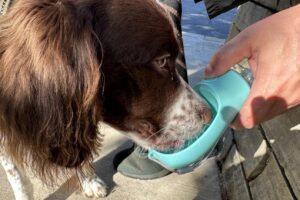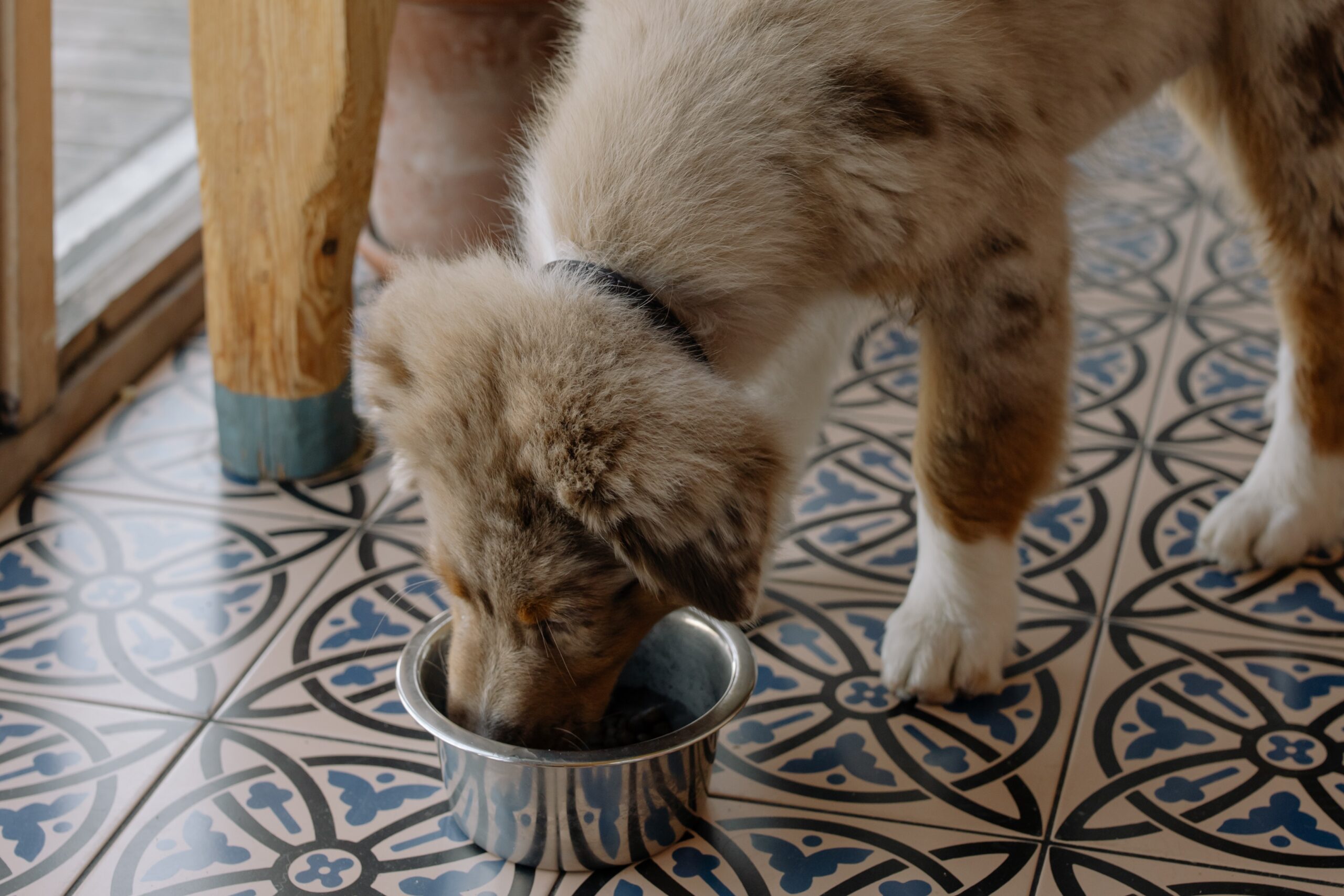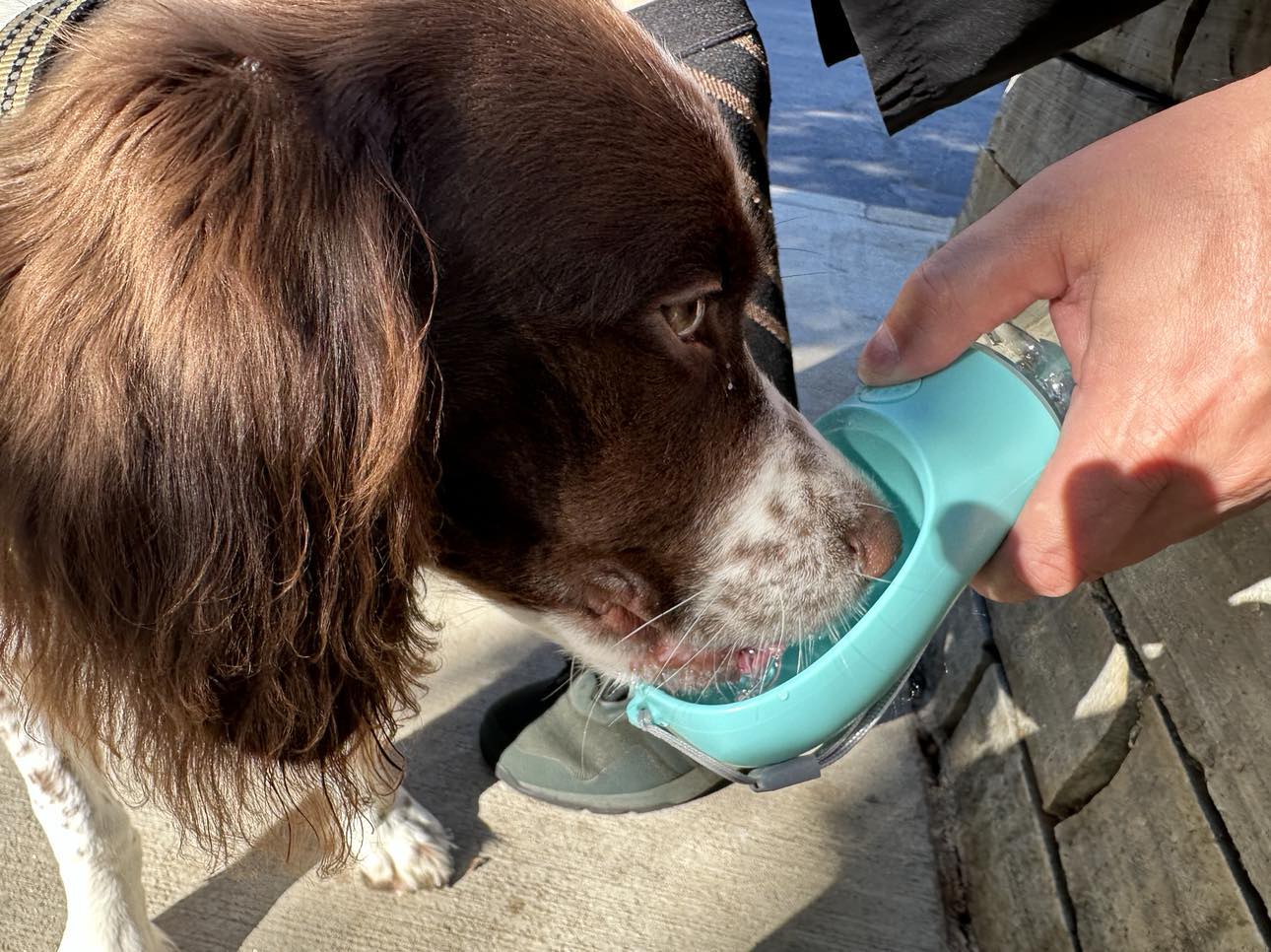As dog owners, we all cherish our furry companions and want to ensure they lead happy and healthy lives. While we may pay attention to their exercise, nutrition, and grooming needs, one crucial aspect that often gets overlooked is their dental health. Canine dental health is of utmost importance, and caring for our dog’s pearly whites goes beyond just ensuring fresh breath and a beautiful smile. A healthy mouth plays a pivotal role in their overall well-being, impacting various aspects of their life, from nutrition and comfort to their general health and longevity.
Dental problems in dogs, if left untreated, can have far-reaching consequences on their health. Dental issues such as plaque buildup, tartar, gum disease, and tooth decay can lead to pain, discomfort, and difficulty eating. Moreover, dental problems can extend beyond the mouth, affecting other vital organs such as the heart, kidneys, and liver. Bacteria from dental infections can enter the bloodstream, leading to systemic health issues that could potentially jeopardize your dog’s overall health.
Caring for your dog’s dental health is essential, but it can sometimes involve unexpected costs, especially when professional dental cleanings or procedures are necessary. This is where pet insurance can come to the rescue. Pet insurance offers financial support for various aspects of your pet’s healthcare, including dental care. By having the right pet insurance coverage, you can better manage the expenses related to your dog’s dental health and provide them with the care they deserve.
Understanding Canine Dental Health
Anatomy of a Dog’s Mouth and Teeth
To comprehend the significance of canine dental health, it’s essential to understand the anatomy of a dog’s mouth and teeth. Dogs have a total of 42 teeth, comprising incisors, canines, premolars, and molars. Each type of tooth serves a specific purpose in their oral function. Incisors are used for nibbling, canines for tearing, premolars for grinding, and molars for crushing.
Furthermore, dogs have a layer of enamel covering their teeth, protecting them from wear and tear. Beneath the enamel lies the dentin, which houses the dental pulp containing nerves and blood vessels. The gums, or gingiva, surround the teeth and serve as a protective barrier against bacteria.
Common Dental Issues That Dogs May Face
Dental problems are prevalent in dogs, with various issues that can arise if dental care is neglected. Some common dental issues include:
- Plaque and Tartar: Plaque is a sticky film of bacteria that forms on the teeth, which, if not removed, can harden into tartar. Tartar buildup can lead to gum disease and other dental complications.
- Gum Disease: Also known as periodontal disease, gum disease occurs when plaque and tartar irritate the gums, leading to inflammation, redness, and swelling. If left untreated, it can progress to more severe stages and cause pain and tooth loss.
- Tooth Decay: Like humans, dogs can experience tooth decay due to the acid produced by bacteria in the mouth. Decaying teeth can lead to pain and infections.
- Broken or Fractured Teeth: Dogs can experience broken or fractured teeth from accidents or chewing on hard objects, causing discomfort and potential infections.
Importance of Regular Dental Check-ups
Regular dental check-ups with your veterinarian are crucial for maintaining your dog’s dental health. During these check-ups, the veterinarian will examine your dog’s teeth and gums, looking for signs of dental problems such as tartar buildup, gum inflammation, or fractured teeth. Early detection of dental issues allows for timely intervention, preventing further complications and ensuring your dog’s comfort.
In addition to professional check-ups, establishing a regular at-home dental care routine is equally essential. Brushing your dog’s teeth, providing dental treats, and using dental toys can help reduce plaque and tartar buildup, promoting good oral hygiene between veterinary visits.
By understanding the anatomy of your dog’s mouth, recognizing common dental issues, and prioritizing regular dental check-ups, you can play an active role in safeguarding your dog’s dental health. A healthy mouth contributes to their overall well-being and ensures that your furry companion enjoys a lifetime of bright smiles and pain-free eating.
Dental Care at Home
Brushing Your Dog’s Teeth: Techniques and Best Practices
Regularly brushing your dog’s teeth is one of the most effective ways to maintain their dental health. However, many dog owners find brushing their dog’s teeth challenging. Here are some techniques and best practices to make the process smoother:
- Start Early: Introduce teeth brushing to your dog when they are still a puppy to get them accustomed to the process from a young age.
- Use Dog-Friendly Toothpaste: Never use human toothpaste, as it can be harmful to dogs. Instead, opt for dog-friendly toothpaste in flavors like chicken or peanut butter that they will enjoy.
- Gradual Introduction: Initially, let your dog lick the toothpaste from your finger to get used to the taste. Then, gently introduce a dog toothbrush or finger brush to clean their teeth.
- Be Gentle: Use gentle circular motions to brush your dog’s teeth and avoid aggressive brushing to prevent discomfort.
Choosing the Right Dental Products for Your Dog
Selecting the appropriate dental products for your dog is essential for effective dental care. Here are some considerations:
- Dog Toothbrush: Choose a soft-bristled toothbrush that is specifically designed for dogs. Alternatively, finger brushes can be a more comfortable option for both you and your dog.
- Dental Wipes: For dogs that are resistant to brushing, dental wipes can be an alternative to remove plaque and debris from the teeth.
- Dental Spray: Dental sprays can help reduce bacteria and freshen your dog’s breath between brushing sessions.
- Dental Rinse: Dental rinses can aid in reducing plaque and bacteria in your dog’s mouth, contributing to their overall dental health.
Incorporating Dental Treats and Toys into Their Routine
In addition to brushing, incorporating dental treats and toys into your dog’s routine can be beneficial for their dental health:
- Dental Treats: Dental treats are specifically designed to promote oral hygiene by reducing plaque and tartar buildup as your dog chews on them. Look for treats with special textures or ingredients that promote dental health.
- Dental Chew Toys: Dental chew toys serve a similar purpose, helping to clean your dog’s teeth while providing entertainment and mental stimulation.
- Interactive Toys: Interactive toys, such as puzzle toys, can encourage your dog to play and engage with the toy, promoting saliva flow and helping to wash away bacteria.
By implementing a consistent dental care routine at home that includes brushing your dog’s teeth, choosing the right dental products, and incorporating dental treats and toys, you can take proactive steps to ensure your dog’s dental health. Remember, a healthy mouth contributes to their overall well-being and helps them lead a happy and comfortable life.
Signs of Dental Problems in Dogs
Identifying Signs of Dental Issues, Such as Bad Breath, Swollen Gums, and Tooth Discoloration
As responsible pet owners, it is essential to be vigilant about our dog’s dental health and watch for signs of potential dental problems. Recognizing these signs early on can prompt timely intervention and prevent further complications. Here are common signs of dental issues in dogs to look out for:
- Bad Breath (Halitosis): Bad breath is often the first indication of dental problems in dogs. Foul-smelling breath can be a result of bacterial buildup in the mouth, indicating gum disease or dental infections.
- Swollen or Red Gums: Healthy gums should be pale pink and free of inflammation. Swollen or red gums, or gums that bleed easily, are signs of gingivitis or periodontal disease.
- Tooth Discoloration: Discolored teeth, such as brown or yellowish spots, can indicate tooth decay or enamel erosion.
- Excessive Drooling: While some drooling is normal, excessive drooling may be a sign of dental discomfort or pain.
- Difficulty Chewing: If your dog is experiencing pain while eating, they may avoid certain foods or exhibit reluctance to chew on toys.
- Pawing at the Mouth: Dogs in discomfort may paw at their mouth or face in an attempt to alleviate pain.
Understanding the Implications of Untreated Dental Problems
Untreated dental problems can have far-reaching consequences on your dog’s health and well-being. Ignoring dental issues can lead to severe complications, including:
- Pain and Discomfort: Dental problems can cause significant pain and discomfort for your dog, affecting their eating habits, behavior, and overall quality of life.
- Tooth Loss: If dental problems are left untreated, tooth loss can occur, further exacerbating pain and difficulties with eating.
- Infection: Bacteria from dental infections can enter the bloodstream, leading to infections in other parts of the body and potentially affecting organs such as the heart, kidneys, and liver.
- Abscesses: Untreated infections can lead to abscesses in the mouth, causing additional pain and discomfort for your dog.
- Systemic Health Issues: Dental problems have been linked to systemic health issues such as heart disease and kidney problems, impacting your dog’s overall health and longevity.
It is crucial to address any signs of dental problems promptly by seeking professional veterinary care. Regular dental check-ups and cleanings can prevent the progression of dental issues and ensure your dog’s oral health is maintained.
By understanding the signs of dental problems and the potential consequences of untreated dental issues, you can take a proactive approach to your dog’s dental health. Regular dental care and professional check-ups can help your furry friend enjoy a healthy mouth and a happy, pain-free life.
The Link Between Dental Health and Overall Health
The Connection Between Dental Health and Systemic Health Issues
The link between dental health and overall health in dogs is more significant than many pet owners realize. Just like in humans, a dog’s oral health can have a profound impact on their systemic well-being. Dental problems can contribute to a range of health issues beyond the mouth, affecting various organs and systems in their body. Some of the key connections between dental health and systemic health issues include:
- Heart Disease: Bacteria from dental infections can enter the bloodstream and travel to the heart, leading to conditions such as bacterial endocarditis. This can be especially concerning for dogs with pre-existing heart conditions.
- Kidney and Liver Problems: Bacteria from the mouth can also travel to the kidneys and liver, potentially causing infections and contributing to kidney and liver disease.
- Respiratory Issues: Dental problems, if left untreated, can result in chronic inflammation in the mouth, which may lead to respiratory issues, particularly if the bacteria are inhaled.
- Diabetes: Poor dental health has been linked to insulin resistance in dogs, which can worsen diabetes or contribute to its development.
- Joint Issues: The chronic inflammation caused by dental infections can exacerbate joint problems, such as arthritis, leading to increased pain and discomfort.
How Dental Problems Can Impact a Dog’s Quality of Life
The impact of dental problems on a dog’s quality of life should not be underestimated. Dental pain and discomfort can be severe, leading to changes in behavior and daily activities. Dogs with untreated dental problems may experience:
- Decreased Appetite: Dental pain can make eating difficult and painful, leading to reduced appetite and weight loss.
- Behavioral Changes: Dogs in pain may become irritable, aggressive, or withdrawn. They may be less willing to engage in play or interact with family members.
- Difficulty Chewing: Dental issues can make chewing difficult, leading to avoidance of certain foods or toys.
- Reluctance to Groom: Dogs with dental pain may avoid grooming their fur or paw at their mouth, neglecting their usual grooming routine.
- Reduced Energy Levels: Dental discomfort can cause dogs to become lethargic and less active, impacting their overall energy levels and enthusiasm.
By understanding the link between dental health and overall health, pet owners can prioritize their dog’s dental care and take proactive steps to maintain their oral health. Regular dental check-ups, professional cleanings, and at-home dental care can help prevent dental problems and ensure a healthier, happier life for your furry companion. Additionally, investing in pet insurance that covers dental care can provide financial support for necessary treatments and encourage timely veterinary visits, further safeguarding your dog’s dental and overall well-being.
Dental Health at Different Life Stages
Dental Care for Puppies: Establishing Good Habits Early On
Dental care for puppies is essential in laying the foundation for a lifetime of good oral health. As puppies start developing their baby teeth at around three weeks old, it’s crucial to begin dental care early on. Here are some tips for establishing good dental habits for your puppy:
- Puppy Teething: Puppies experience teething discomfort, so provide them with appropriate chew toys and teething rings to alleviate their pain and prevent them from chewing on inappropriate objects.
- Puppy Toothbrush and Toothpaste: Introduce your puppy to the concept of toothbrushing by using a soft-bristled puppy toothbrush and dog-friendly toothpaste. Start with gentle brushing, gradually increasing the duration as your puppy becomes more comfortable.
- Regular Check-ups: Schedule regular veterinary check-ups to monitor your puppy’s dental development and address any potential dental issues early on.
Dental Care for Adult Dogs: Maintaining Oral Health as They Age
As your dog enters adulthood, maintaining good dental care practices becomes crucial to prevent dental problems. Here are some tips for maintaining your adult dog’s oral health:
- Regular Brushing: Continue regular toothbrushing at least two to three times a week to prevent plaque and tartar buildup.
- Dental Treats and Toys: Incorporate dental treats and chew toys into your adult dog’s routine to help clean their teeth while providing mental stimulation.
- Professional Dental Cleanings: Consider scheduling professional dental cleanings with your veterinarian annually or as recommended based on your dog’s dental health.
Dental Care for Senior Dogs: Addressing Age-Related Dental Issues
Senior dogs are more prone to dental issues due to age-related changes in their oral health. As your dog ages, pay special attention to their dental needs:
- Dental Check-ups: Increase the frequency of dental check-ups to monitor your senior dog’s oral health and address any dental issues promptly.
- Dental Diets: Consider transitioning to dental-specific diets formulated to promote oral health and prevent tartar buildup.
- Soft Food Options: If your senior dog has dental pain or difficulties chewing, consider offering soft food options that are easier on their teeth.
- Dental Treatments: Discuss with your veterinarian whether dental treatments, such as dental sealants or fluoride applications, are beneficial for your senior dog’s oral health.
By tailoring dental care to different life stages, you can provide your dog with the best chance of maintaining optimal oral health throughout their life. Regular dental care, consistent check-ups, and a proactive approach to addressing dental issues can significantly contribute to your dog’s overall well-being and happiness. Additionally, having pet insurance that covers dental care can provide peace of mind and financial support for any necessary dental treatments your furry friend may need at any life stage.
Professional Dental Cleanings and Procedures
The Importance of Professional Dental Cleanings
While regular at-home dental care is essential, professional dental cleanings by a veterinarian play a vital role in maintaining your dog’s dental health. These cleanings are more thorough and address areas that may not be accessible during home brushing. Here’s why professional dental cleanings are crucial:
- Comprehensive Examination: A veterinarian will conduct a comprehensive oral examination, including dental X-rays, to assess your dog’s dental health thoroughly.
- Tartar and Plaque Removal: During the cleaning, the vet will remove tartar and plaque buildup from your dog’s teeth, preventing the progression of dental disease.
- Polishing: After cleaning, the vet will polish your dog’s teeth to smooth the tooth surfaces, making it harder for plaque to adhere in the future.
- Addressing Dental Issues: Professional cleanings enable early detection and treatment of dental issues like gum disease, tooth decay, and infections, preventing potential complications.
Anesthesia-Free Dental Cleaning Option
Anesthesia-free dental cleanings (AFD) have gained popularity as an alternative to traditional dental cleanings. In AFD, dental scaling is performed without the use of anesthesia, allowing dogs to remain awake during the procedure. However, it’s essential to understand the pros and cons of this option:
Pros:
- Non-Invasive: AFD can be appealing to pet owners who are concerned about anesthesia risks for their dogs.
- No Recovery Period: Since dogs are awake during AFD, there is no recovery time required after the procedure.
Cons:
- Limited Effectiveness: Anesthesia-free cleanings may only address the visible tartar on the tooth surface, leaving underlying dental problems undetected and untreated.
- Stress for Dogs: Some dogs may find the cleaning process uncomfortable or distressing, as they are not sedated during the procedure.
While AFD can serve as a temporary solution or maintenance option for dogs with minimal dental issues, it is not a substitute for comprehensive, anesthetic dental cleanings. Regular professional dental cleanings under anesthesia are still the gold standard for optimal dental care in dogs.
Ultimately, the combination of regular at-home dental care, professional dental cleanings, and proper dental procedures, when needed, will contribute to maintaining your dog’s pearly whites and overall dental health. Don’t forget to check if your pet insurance policy covers dental care, as having coverage can help manage the costs associated with dental treatments and ensure your furry friend receives the best possible dental care throughout their life.
Special Considerations for Dental Health
Dental Care for Small Breed Dogs
Small breed dogs, such as Chihuahuas, Yorkshire Terriers, and Pomeranians, have specific dental needs that require special attention. Due to their smaller mouths and teeth, they are more prone to certain dental issues. Here are some considerations for dental care in small breed dogs:
- Size-Appropriate Dental Products: Use dental products specifically designed for small dogs, such as toothbrushes with smaller bristles and toothpaste formulated for their size.
- Regular Dental Check-ups: Schedule more frequent dental check-ups for small breed dogs, as they may develop dental issues more rapidly.
- Dental Treats and Toys: Offer smaller-sized dental treats and toys suitable for your small dog’s mouth to help promote oral hygiene and provide mental stimulation.
Dental Care for Dogs with Certain Health Conditions
Dogs with specific health conditions may require extra attention to their dental health. Certain medical conditions can influence dental care needs, and dogs with these conditions may be more susceptible to dental problems. Here are some examples:
- Diabetes: Diabetic dogs are at higher risk of gum disease, so it’s essential to maintain excellent dental care and monitor their oral health closely.
- Heart Disease: Dogs with heart conditions may require prophylactic antibiotics before dental procedures to prevent bacterial endocarditis.
- Immune Disorders: Dogs with immune system disorders may be more prone to dental infections, requiring regular dental check-ups and prompt treatment of any issues.
- Senior Dogs: Senior dogs often have age-related dental problems and may benefit from more frequent dental cleanings and specialized dental care.
- Medications: Some medications can cause dry mouth, leading to an increased risk of dental issues. Talk to your veterinarian about any potential dental health concerns related to your dog’s medications.
For dogs with specific health conditions, it’s crucial to work closely with your veterinarian to develop a customized dental care plan tailored to their individual needs. Regular veterinary check-ups and open communication about your dog’s health will ensure they receive the appropriate dental care to support their overall well-being.
By being mindful of these special considerations for dental health, you can address your dog’s unique dental needs and provide them with the best possible care to maintain their pearly whites and ensure a healthier, happier life. Additionally, having pet insurance that covers dental care can be especially beneficial for dogs with specific health conditions, as it can help manage the costs associated with specialized dental treatments and support their overall dental health journey.
Overcoming Dental Care Challenges
Tips for Introducing Dental Care to Resistant Dogs
Not all dogs readily accept dental care, and some may show resistance to toothbrushing or other dental procedures. However, with patience and positive reinforcement, you can gradually help your furry friend become more comfortable with dental care. Here are some tips for introducing dental care to resistant dogs:
- Go Slowly: Start by simply touching your dog’s mouth and teeth gently without any tools. Gradually introduce a toothbrush or dental wipe, allowing your dog to sniff and become familiar with it.
- Use Tasty Toothpaste: Choose a dog-friendly toothpaste with a delicious flavor that your dog will enjoy. Let them taste the toothpaste to create a positive association.
- Positive Reinforcement: Praise and reward your dog with treats or affection after each successful dental care session to reinforce positive behavior.
- Make It a Game: Turn dental care into a fun and engaging game by incorporating playtime before and after the activity.
Strategies for Making Dental Care a Positive Experience
Ensuring that dental care is a positive experience for your dog is crucial in encouraging cooperation and making the process stress-free. Here are some strategies to make dental care a positive experience:
- Create a Calm Environment: Choose a quiet and comfortable area for dental care to reduce distractions and make your dog feel at ease.
- Start Early: Begin dental care when your dog is still a puppy to establish it as a routine part of their life.
- Reward Good Behavior: Use positive reinforcement techniques, such as treats, praise, and petting, to reward your dog’s cooperation during dental care.
- Use Play and Toys: Incorporate dental care tools, such as toothbrushes or dental wipes, into playtime to help your dog associate them with fun and positive experiences.
- Be Patient: Be patient and understanding if your dog takes time to adjust to dental care. Avoid forcing the process, as it may create a negative association.
By employing these strategies and customizing your approach to your dog’s unique personality, you can gradually overcome dental care challenges and turn dental hygiene into an enjoyable activity for both you and your canine companion.
Remember, regular dental care is vital for maintaining your dog’s dental health and overall well-being. Consistent and positive dental care practices, along with regular veterinary check-ups, can help prevent dental issues and contribute to your dog’s happy and healthy smile. Additionally, having pet insurance can offer peace of mind, knowing that you have financial support for any dental treatments or check-ups your dog may need throughout their life.
Conclusion
Caring for your dog’s dental health is not only about maintaining their pearly whites but also essential for their overall well-being. Dental problems can lead to pain, discomfort, and even impact your dog’s systemic health. Regular dental care, including at-home dental routines and professional dental cleanings, plays a crucial role in preventing dental issues and promoting a healthier, happier life for your furry friend.
As a responsible pet owner, you understand the significance of providing the best possible care for your dog. However, unexpected dental issues can arise, and dental treatments can incur significant expenses. This is where pet insurance can be a valuable resource to support your dog’s dental care needs.
With the right pet insurance coverage, you can have peace of mind knowing that dental treatments, check-ups, and procedures may be covered, depending on your policy. This financial support can alleviate the burden of unexpected dental expenses, allowing you to focus on providing your dog with the dental care they need to maintain optimal oral health.
By prioritizing your dog’s dental health and considering the potential benefits of pet insurance, you can ensure that your canine companion enjoys a healthy, pain-free smile and a higher quality of life overall. Remember, a happy and healthy dog begins with proper dental care, which contributes to their overall well-being and strengthens the bond between you and your beloved furry companion.










